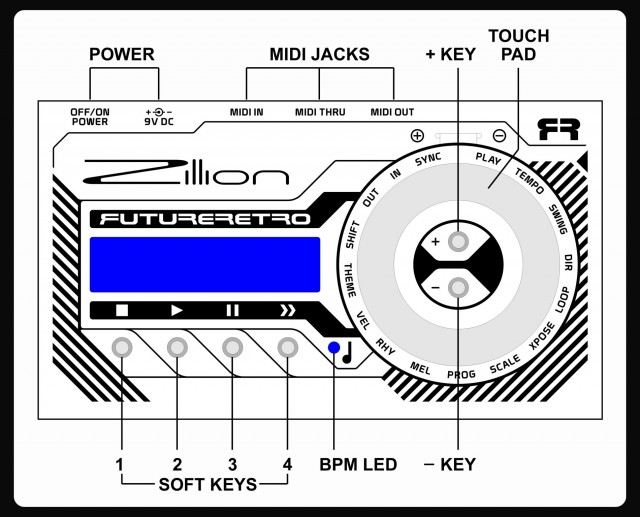Machines give us something that would have amazed musicians from centuries past: they let us make melodies without playing them directly. Now, there are three ways of doing that. One, there are tools that take what you play and turn them into sequences. Two, there are interfaces for making melodies with touch, sliders and knobs.
And then there’s a third category: boxes that can actually generate new melodies, all under your control. You control the parameters of the sequence, but the content is algorithmically produced.
Future-Retro’s Zillion does just about anything you would ever dream of in that third category. It’s got a history: the basic algorithms are modeled after a rare 1970s gadget called the Triadex Muse, the work of legendary artificial intelligence pioneers Marvin Minsky and Edward Fredkin of MIT. (It’s hard to imagine AI experts doing anything like this now, somehow.)
The Triadex Muse used a massive series of sometimes-confusing faders, essentially using a bit of a hack to create logic from simple digital circuitry. From a theme you input, the box will then spin tunes over time. (A Light Show add-on was an option. Groovy. See the history of this box.)
There’s no light show or big faders on the Zillion. In their place, you get a touch ring and some simplified controls, aided by the display. But the basic concept remains the same, allowing this box through nerdy manipulations of “shift registers” – simple means of storing notes – can produce oodles of possibilities. (Zillions, perhaps, however many that may be.)
Those mysterious powers are cool, but you might first be impressed with the ways in which the Zillion has some more practical design considerations.
Operating the device gives you some nice live performance controls. You can quickly set loop points from both beginning and end, choosing just a few beats or dozens of bars. You can rapidly transpose, also from hot keys. You can confine music to scales – 16 built in, with dozens more available as user presets.
There’s manual step mode for editing, too. And you can control not only pitch but velocity with the latter fed by a separate source – that could be another pattern and, if your synth will use velocity to control another parameter, could generate other effects. With MIDI in, out, and thru, it should work conveniently with any MIDI-ready gear.
In fact, even if you hadn’t pondered going generative, you might pick up a Zillion for this easy performance control alone. Not only is everything controlled by hot keys, but those hot keys can be set from MIDI input for remote control. All the other basics are covered, too, and you can quickly set channel for using multiple devices. I’m impressed at least in browsing the box and the video on how few keystrokes are required for functions.
Where things get interesting, though, is the Muse-inspired algorithmic business. Enter a melody manually or from an external device, and you can spawn new tunes by interacting with the digital data on the device. Alter the logic, and you change the tune. It’s both the most compelling feature and perhaps the reason you might decide you want this — or not. It’s a different way of manipulating tunes. But it looks like Future-Retro have made an uncommonly approachable device for handling that.
I’m very keen to get this one in for review to see what the actual experience is like, musically speaking. But it’s great to see something special in terms of hardware sequencing, as I’ve found those options limited. That’s a shame, with so many great hardware instruments to control.
And at US$300, it could be irresistible – breathing more value into whatever nice gear you happen to own.
Stay tuned, but in the meantime, here’s inventor Jered Flickinger showing his creation to Andreas Schneider (of Schneidersladen and ALEX4, Berlin purveyors of such oddities), at NAMM earlier this year:
Future-Retro introducing the Zilion on NAMM 2014 from Andreas Schneider on Vimeo.
Full specs:
Zillion Sequencer
Via Synthtopia.

